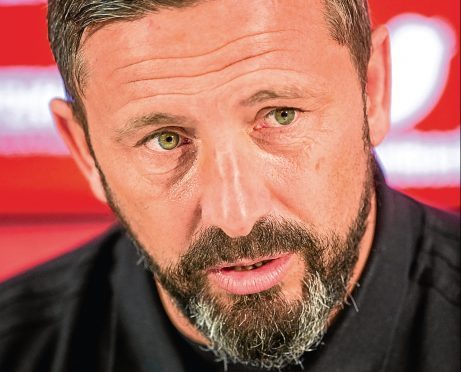Aberdeen manager Derek McInnes says the plight of Sunderland has reiterated his stance that he won’t rush into any decision to leave Pittodrie.
McInnes remains the favourite to takeover at Rangers but confirmed yesterday that he has not been approached by the Ibrox side to replace Pedro Caixinha, who was sacked last week.
The 46-year-old declined the opportunity to succeed David Moyes at Sunderland in the summer – and it proved a shrewd decision.
The man who took on the job, former Preston manager Simon Grayson, was sacked by the Black Cats earlier this week after just 18 games in charge.
McInnes said: “It was sad to see the news about Simon, it doesn’t give any satisfaction seeing that because Simon is a good manager.
“He proved that before he went there and I’m sure he will prove that again elsewhere.
“It just shows you the difficulties managers have.
“Managers are not blameless for results, of course, but when things are as poor as that then it’s an indication that it’s more than the manager.
“It’s sad to see someone lose their job so early in the season like that but it’s clearly very difficult circumstances to be working in.
“I can only speak for myself and the way I felt at the time because I don’t know the ins and outs of what’s gone on there.
“Clearly it wasn’t going to be an easy job – you don’t get easy ones.
“So it was always going to be tough and that’s how Simon has found it.”
McInnes believes Scottish managers are under increasing levels of pressure to be successful – an opinion backed up by the fact there have already been 13 managerial changes at the SPFL’s 42 clubs since the start of the season.
The Aberdeen manager said: “My worry is that up in Scotland we are in a bit of danger of becoming like it is down south.
“We’ve seen a third of the managers in the Premiership sacked before November and there has been a lot of casualties in the Championship and elsewhere too.
“Normally when you work in a stable environment you usually get more opportunity to overcome a poor period.
“But these days there seems to be more knee-jerk reactions, it’s the modern way because you can quickly get a groundswell against a manager.
“The whole thing has completely changed, I think it’s totally different being a manager now compared to ten or 15 years ago.
“Sometimes it’s down to who the owner is and their background.
“If you have a steady hand, someone who has been involved for a long time and knows the responsibilities involved then you have a better chance.
“Someone like our chairman here, who knows that results can fluctuate.
“But you have others who always think there is someone better round the corner, someone to do a better job.
“Results have always got to be there or a manager feels the heat.
“But it helps when you have a chairman who has been through a lot worse and understands the game.
“In any walk of like it’s important to have experience, calmness and balance in certain situations.
“I’ve used my chairman here as an example but I do think those kind of owners are getting less and less.
“You see the volatile approach down in England and I just think we have to be careful up here not to follow suit.”
